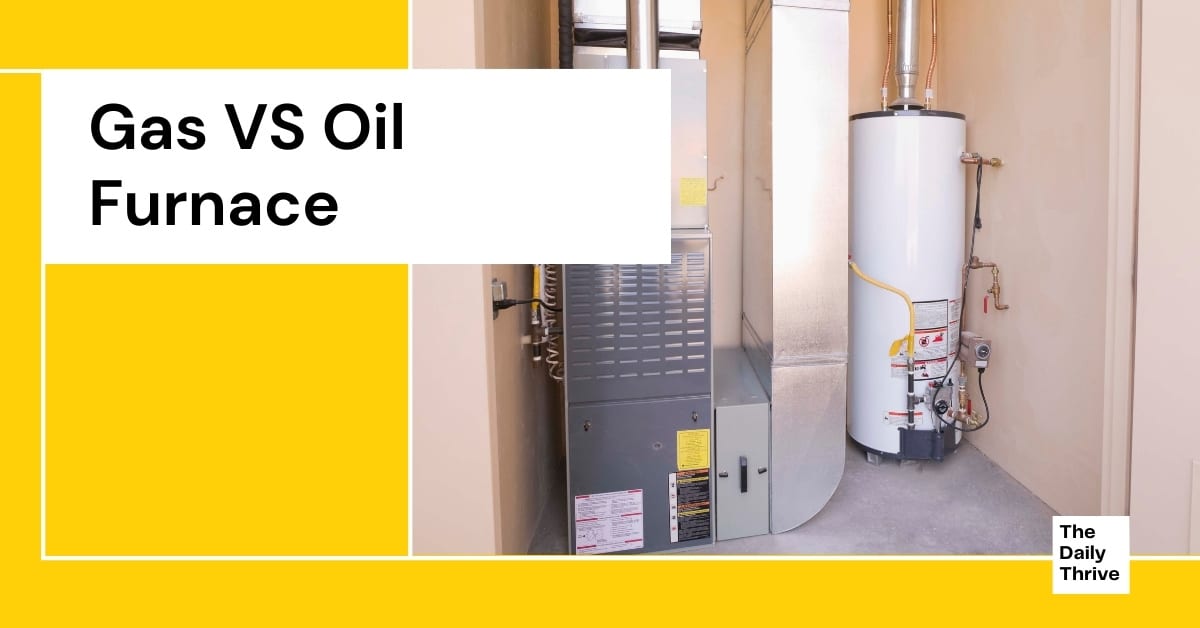When upgrading a heating system or purchasing a new one, one of the many factors that need to be considered is the fuel source. You have two options: Oil Furnace or Natural Gas Furnace. Both will surely deliver warmth and comfort to your home, but in different ways, and many factors should be considered to know which of the two works best for your area, your family, and your home.
Knowing the list of pros and cons of each heating system fuel source will help you decide what is suitable for your specific and personal needs.
According to energystar.gov, heating and cooling costs make up about 42% of residential energy consumption in the US. While in Canada, the residential heating expense goes up to 63%. That is a whole lot of energy consumed by residential HVAC alone.
Efficiency ratings, commonly referred to as Annual Fuel Utilization Efficiency (AFUE), which measures and indicates the efficiency of your furnace’s combustion efficiency, must be first considered when getting a new furnace.
In the AFUE standard, the higher the rating, the higher the unit’s efficiency is. This makes gas furnaces more efficient with efficiency ratings between 89% and 98% than oil furnaces with lower ratings between 80% and 90%.
However, higher efficiency comes as a cost for gas furnaces, making them 10% to 25% pricier than oil furnaces.
Gas Furnace Pros
If you’re considering fueling your home with natural gas, you should know some of the pros and cons.
More Affordable Fuel Source
The availability of natural gas allows for steady supply and demand, hence, a stable and low price. While oil’s availability usually seems unpredictable and its price high.
This is why more than 50% of American homes use natural gas in the US, while only 8% use oil.
Clean & Highly Efficient
Natural gas is also the cleanest nonrenewable energy source aside from the high AFUE rating of gas furnaces compared to oil furnaces.
Easier Maintenance
Gas furnaces require little and less maintenance than oil because of their clean-burning ability.
Nontoxic and Nonpoisonous
Gas being nontoxic and nonpoisonous can be conveniently installed underground without any fear of soil or groundwater contamination in case of a leak.
Gas Furnaces Cons
Lesser BTU
Your furnace’s BTU refers to its heat output. The higher the BTU, the more heat your furnace can produce. Unfortunately, in this case, natural gas furnaces have fewer BTUs and heat loss compared to the oil furnace.
More Expensive To Purchase
As mentioned above, gas-propelled furnaces are 10% to 25% more expensive than oil furnaces because of their higher Efficiency Rating (AFUE). Also, additional installment cost for a municipal gas line is necessary if no pipeline runs to your home yet.
Undetectable
In case of a gas/ carbon monoxide leak, it is very difficult to detect gas out in the air because of its smokeless and odorless nature. This can be very dangerous and even fatal. In fact, according to the Centers for Disease Control and Prevention (CDC), over 20,000 are hospitalized due to CO poisoning, of which 400 dies, making it the leading cause of poisoning deaths in North America.
Check out our selection of furnace fire and safety systems so you and your family can sleep soundly and comfortably at night.
Requires Safety Precautions
Special safety precautions must be followed properly by all household members that use a gas furnace since it is highly combustible in the air.
Less Green
Natural gas is recovered through hydraulic fracturing or fracking, which has prompted environmental concerns and high environmental costs.
Oil Furnaces Pros
To help you decide whether an oil furnace is a right choice for your home, let’s look at the oil furnace pros and cons.
Produces More Heat
Oil having higher BTU than natural gas also delivers more heat and burns hotter than gas furnaces. Thus, it can manage high temperatures better than gas furnaces and is great for homes in regions with freezing Winters.
Safer to Store and Use
Oil does not explode in an accidental leak, unlike natural gas, though flammable. Also, oil does not produce a dangerous and fatal gas like carbon monoxide, making it safer to store and use.
Detectable
In case of a leak and system breakdown, oil furnaces send out clear alerts and warning signs such as odor, smoke, and soot.
High Dependability
Using oil to fuel a furnace will provide you with the flexibility on how to control, conserve and use your oil supply. When you sign up for an automatic oil delivery, you are even ensured that you will never run out of fuel, especially on time when you need it the most.
Longer Lifespan
With proper maintenance, oil furnaces can live longer than gas furnaces with a guaranteed product life of 30 years.
Ideally Used In Remote Areas
Natural gas pipelines are still continuously made today, so basically, there are still areas where it is unavailable, like in Vermont and New Hampshire, where there are few natural gas lines. So, if you are in that area, oil offers a great alternative.
Oil Furnaces Cons
Higher Fuel Cost
Though oil furnaces are more affordable to purchase, running them is more costly since acquiring heating oil is more expensive than natural gas. Aside from the oil itself, oil deliveries, oil changes, and oil filter changes must also be considered and paid for.
Inconvenience
Heating oil is not transported through a pipeline infrastructure. It must be stored in an on-site storage tank and refilled regularly unless you sign up for automatic oil delivery.
High Maintenance
Unlike natural gas, oil does not burn clean. Oil combustion produces dirt and soot buildup, which requires frequent unit cleaning, repair, and maintenance.
Requires Use Of Additives
During Winter, when temperatures go down, heating oil tends to become gel-like, and additives may be necessary to correct it so your furnace can continue to perform properly.
Technically, both oil and gas furnaces will deliver warmth and comfort to your home, but one may check more boxes to your list of needs and home specifications than the other. There are also electric furnaces that require a more constant energy source to heat your home.
If natural gas lines are unavailable in your area, then an oil furnace might be the way to go. Regardless of which type of heat source you prefer, use a qualified HVAC contractor and get several quotes before you make any investment in your home.






